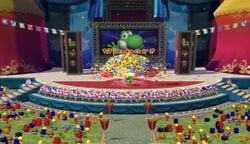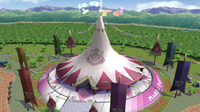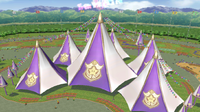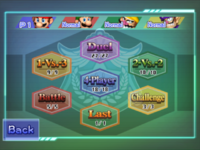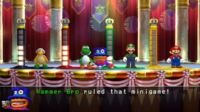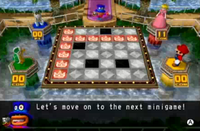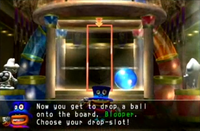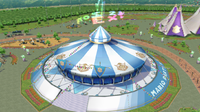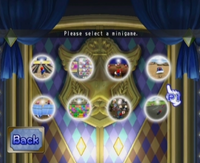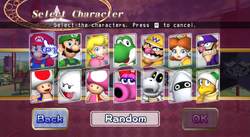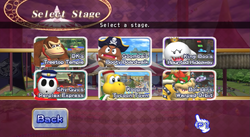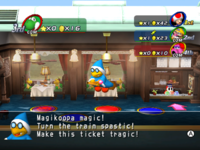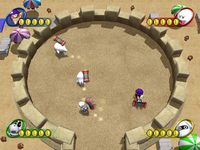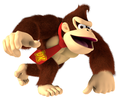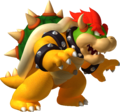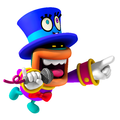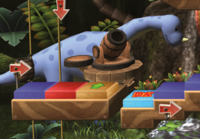Mario Party 8
| Mario Party 8 | |||||||||||||||
|---|---|---|---|---|---|---|---|---|---|---|---|---|---|---|---|
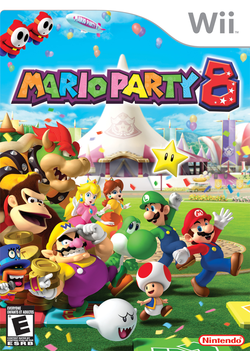 North American box cover For alternate box art, see the game's gallery. | |||||||||||||||
| Developer | Hudson CAProduction Nintendo SPD Group No.4 | ||||||||||||||
| Publisher | Nintendo | ||||||||||||||
| Platform(s) | Wii | ||||||||||||||
| Release date | Original release: Nintendo Selects Release: | ||||||||||||||
| Language(s) | English (United Kingdom) English (United States) French (France) German Spanish (Spain) Italian Japanese Korean | ||||||||||||||
| Genre | Party | ||||||||||||||
| Rating(s) |
| ||||||||||||||
| Mode(s) | Single player, multiplayer | ||||||||||||||
| Format | Wii: | ||||||||||||||
| Input | Wii:
| ||||||||||||||
| Serial code(s) | |||||||||||||||
Mario Party 8 is a game for the Wii. It is the eighth mainline installment of the Mario Party series and the thirteenth overall. It is the last Mario Party home console game to be developed by Hudson Soft before Nintendo Cube received control of the series. It was first released in North America on May 29, 2007, and finally released in Hong Kong and South Korea on July 12, 2008, more than a year later. It became a Nintendo Selects title in Europe on March 22, 2013.
Certain parts of the game, such as board gameplay, are displayed in a 4:3 ratio, fitted with borders on the left and right parts of the screen, while other portions such as the main menu, are matted to 16:9 widescreen.
Story[edit]
The exuberant ringmaster MC Ballyhoo and his talking hat, Big Top, have invited Mario and the rest of the crew to the Star Carnival. Ballyhoo holds a special event, the Star Battle Arena, in which a contestant must win five successive party duels across the five standard boards. The winner will be crowned the carnival's Superstar and receive a year's supply of Candy.
Once the player has claimed victory in all five duels, Ballyhoo holds an award ceremony to present the year's supply of Candy in addition to a special reward, which is revealed to be the magical Star Rod. Before the player can receive their reward, however, Bowser swoops in and steals the Star Rod before retreating to his own board, Bowser's Warped Orbit. The player and Ballyhoo then follow Bowser to his board for one final duel.
After the player triumphs over Bowser's chosen minion (either Blooper or Hammer Bro), he begrudgingly returns the Star Rod, only to quickly change his mind and challenge the player to a final showdown for the Star Rod. Using the Star Rod's magical powers, the player defeats Bowser, then returns to the carnival with Ballyhoo, where they are declared the Superstar.
Gameplay[edit]
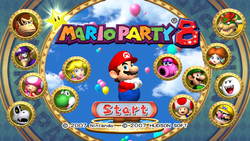
Mario Party 8 uses the Wii Remote and its motion control capabilities in minigames, performing gestures such as pointing-and-shooting, turning, waving, shaking, and twisting the Wii Remote. Player-created Miis are also featured, often within crowds, in certain minigames, and as the player's character in Extra Mode. By playing regular party games, minigames, and completing the Star Battle Arena mode, players can earn Carnival Cards, which in turn can be spent to unlock figures and game features.
Mario Party 8 combines the social, strategic gameplay of traditional board games with quick, action-oriented minigames. Players can collect and win coins to trade them for Stars, buy Candy, and trigger special events on the board. Each board has a unique way of obtaining Stars, though most require finding a unique Star Space and trading a certain number of coins for one.
Before each game starts, MC Ballyhoo introduces the board, and each player rolls a Dice Block to determine the order of play. On every turn, each player rolls a Dice Block numbered one to ten to move along the game board. Prior to rolling, players can use Candy (if they possess any) and study the game board.
Party Tent[edit]
The Party Tent is the main attraction of the Star Carnival in Mario Party 8. It appears in the lower right of the carnival and is the second-biggest tent. In this tent, characters can play on the six boards and play as any of the playable characters, not counting Miis. There are three game types.
Battle Royale and Tag Battle[edit]
In Battle Royale, everyone is pitted against each other, with each player having their own coin and star count. Each player can hold up to 3 pieces of Candy; if any more is collected afterwards, one of them has to be discarded to lower it back to 3. The color of the space each player lands on at the end of everyone's roll determines which type of minigame will be played, with Blue Spaces and DK Spaces putting the player in the blue category, Red Spaces and Bowser Spaces putting the player in the red category, and Green Spaces putting the player in the green category; those who end their turn entering a Lucky Area or exiting King Boo's Haunted Hideaway will not be sorted. Green and unsorted players are randomly sorted into either the red or blue category. For instance, if two players are on Red Spaces and the other two players are on Blue Spaces, the minigame arrangement will be 2-vs-2.
In Tag Battle, players choose two teams of two and go head-to-head. Each team shares coins and stars, and can hold up to 5 pieces of Candy shared between the two members of the team. In Koopa's Tycoon Town, each Hotel now has two icons at the top, with both members of the team being shown if they own the Hotel. Minigame types are no longer determined by spaces; rather, they are randomly chosen between 4-Player and 2-vs-2 minigames, with the latter always pairing players based on their teams, and the prize money is given to each member rather than each team.
In both cases, at the end of everyone's roll, a minigame starts, and is randomly chosen in a wheel of all available minigames of said type. The prize for winning the minigame is usually 10 coins, given in full to every player who wins, including to each player in teams of two or three. However, there are also coin minigames in which players (or teams) collect coins in the minigame itself, which are then added to the coin counter of each player (or team in Tag Battle). In Winner or Dinner, the coins will be paid in full to each team member, rather than being divided between the two, and in Grabbin' Gold, each player in the 3-player team will similarly receive the full amount of coins the team collected. Rarely, however, a Battle Minigame will start, with each player waging coins determined by a roulette, which then get distributed back to the players based on their rankings in the minigames. Battle Minigames also occur in Tag Battle, although each team, not player, wages coins. Coins are still distributed via placement, rather than to the team with the victor.
Battle Royale and Tag Battle feature an event similar to the Last Five Turns Event from previous Mario Party titles, known as Chump Charity, which occurs once there are five turns remaining. During this event, MC Ballyhoo reviews the player (or team) rankings and offers the player (or team) in last place a free piece of Duelo Candy (in Koopa's Tycoon Town, the last-place player or team receives 30 coins instead); if multiple players are tied for last place, all of them receive the last-place prize. Before gameplay resumes, coin bag pickups are placed on every red space and single-coin pickups are placed on every other space. These pickups may only be collected once by the first player who reaches the space they are on. In King Boo's Haunted Hideaway, these coins and coin bags are removed once King Boo shuffles the board.
If one player crosses paths with an opponent while under the effects of a Duelo Candy (if multiple opponents are on the same space, the attacker can choose who to duel or let the game pick randomly), they will duel the opponent in a one-on-one Duel Minigame. The winner throws a dart at a spinning wheel to determine what prize they receive from the loser. If the attacker wins, they will be able to take Stars or coins, while if the defender wins, they will only be able to take coins.
After the last turn, a ceremony is held at the Star Carnival Stage, and if the Bonus Stars option is turned on, MC Ballyhoo announces Bonus Stars to players (or teams) who reach certain qualifications for them; if multiple players (or both teams) tie for a single ranking, all of the players who reached said qualifications receive the Bonus Stars. After the ceremony, the winner (or winning team in Duel Battle), which is the player (or team) with the most Stars and coins, becomes the Superstar. If multiple players (or both teams) tie for first place, the placement is then decided by dice rolls; the player (or team) who rolls the highest wins the battle.
The Bonus Stars that may be awarded at the end of a party are as follows:
- Minigame Star: Awarded to the player(s) who won the most coins in minigames played at the end of each turn. Typically, this qualifies as the player who won the most minigames.
- Candy Star: Awarded to the player(s) or team(s) who used the most Candy. This Bonus Star replaces the Orb Star from Mario Party 6 and Mario Party 7.
- Green Star: Awarded to the player(s) or team(s) who landed on the most Green Spaces.
- Running Star: Awarded to the player(s) or team(s) who traveled the most spaces. Teleportation mechanics and other means of movement besides dice rolls do not count toward this bonus.
- Shopping Star: Awarded to the player(s) or team(s) who spent the most coins in Candy Shops.
- Red Star: Awarded to the player(s) or team(s) who landed on the most Red Spaces. Landing on Bowser Spaces does not count toward this bonus.
Duel Battle[edit]
In Duel Battle, all boards are smaller than in Battle Royale and Tag Battle (except King Boo's Haunted Hideaway, which is larger) and offer different objectives, similar to Solo Cruise in Mario Party 7. Minigames start only upon landing on Vs. Spaces or Challenge Spaces. Duel Spaces initiating a duel minigame between two players, with the loser forced to give coins to the winner afterward, while Challenge Spaces allow a player to throw a dart to earn a certain number of coins after winning a single-player Challenge Minigame. After a player is close to achieving either the most coins or Stars, a roulette is spun to reward whoever is likeliest to lose, possibly either Candy or coins (depending on the board played), or nothing. If neither player has completed the objective after 30 turns, Ballyhoo end the game in a tie, but if the player does fulfill it, they earn 20 Carnival Cards.
The winning conditions for each board is as follows:
- DK's Treetop Temple and King Boo's Haunted Hideaway: Collect two Stars.
- Goomba's Booty Boardwalk: Reach Captain Goomba with at least 50 coins.
- Shy Guy's Perplex Express: Reach Holly Koopa with at least 50 coins.
- Koopa's Tycoon Town: Collect four Stars.
- Bowser's Warped Orbit: Reduce the opponent's Star count to zero.
Star Battle Arena[edit]
Star Battle Arena is the single-player mode of Mario Party 8. The player chooses a character and competes against five COM-controlled characters over five separate duels. The five standard boards are played in order: DK's Treetop Temple, Goomba's Booty Boardwalk, King Boo's Haunted Hideaway, Shy Guy's Perplex Express, and Koopa's Tycoon Town. The sixth, unlockable board, Bowser's Warped Orbit, is played for a final showdown. The rules of Duel Battle are used for all six duels (players take turns without regular minigames), and each duel has a different victory condition from the Party Tent's Battle Royale and Tag Battle. As the player progresses through the duels, their CPU-controlled opponents become more adept.
After completing Bowser's Warped Orbit, Bowser challenges the player to the Last Minigame, Superstar Showdown. Defeating Bowser completes the mode. The reward for completing Star Battle Arena mode is 200 Carnival Cards. Additionally, Bowser's Warped Orbit and the Minigame Wagon (in the Fun Bazaar) will be unlocked, as well as either Blooper or Hammer Bro, depending on who was fought against in Bowser's Warped Orbit. At least two playthroughs of Star Battle Arena are required to unlock both unlockable characters, which will always be random unless one of the unlockable characters is the player character, in which case, the other one will forcefully be the opponent.
Minigame Tent[edit]
In the Minigame Tent, players can play all of the minigames they have unlocked in the Party Tent or Star Battle Arena. Duel and Challenge minigames can only be unlocked in the Star Battle Arena during solo play, or in the Party Tent when using a Duelo Candy or playing Duel Battle. Completing minigames earns the player cards for the player to spend at the Surprise Wagon. There are a total of five ways to play the minigames, as detailed in the sections below.
Free Play Arcade[edit]
- “Welcome to Free Play Arcade! You can play any minigame! Any you've previously seen on the party boards, that is! So many minigames! So much fun! Let your minigame mania run wild!”
- —MC Ballyhoo, Mario Party 8
Free Play Arcade is a game mode where the players can freely choose any minigame to play. However, minigames will first need to be unlocked by playing in Party Tent or Star Battle Arena, or purchasing them from the Minigame Wagon at the Fun Bazaar. In this mode, Miis often appear as spectators, often replacing species like Goombas and Koopa Troopas.
Crown Showdown[edit]
- “Crack open Crown Showdown yet? Head there to see who's truly the minigame champion!”
- —MC Ballyhoo, Mario Party 8
Crown Showdown is a game mode that involves players trying to win the most minigames. At the beginning, the player can choose between 4-Player minigames and Duel minigames. If the player chooses the 4-Player minigames, they can then choose to play between 4-Player minigames, 1-vs.-3 minigames, 2-vs.-2 minigames, or random. The player also can choose how many wins are required to win the showdown from 3, 5, or 7. Each time, the game randomly selects a minigame that the player has already unlocked. Whoever wins the game receives a point, and whoever reaches 3, 5, or 7 points first is the winner.
- In-game rules
"In Crown Showdown, you'll race to win a set number of minigames before competitors do it first! What type of minigames? Up to you! Or select Random and leave it to chance!"
Flip-Out Frenzy[edit]
Flip-Out Frenzy is a game mode set in a small pond with a 6×6 board containing thirty-two gray squares and four black ones. The objective is that players must compete in minigames and color the entire board. Once a player wins a minigame, they get to pick which squares they want to flip over to match their emblem/color. When a player picks a square, the horizontal and vertical rows of the square next to it get colored as well. If more than one player wins a minigame, or a tie occurs, no one gets to pick. After all the squares are colored, MC Ballyhoo turns two black squares at random into normal squares. Once those ones are colored, the game mode ends, and the player with the most squares of their emblem/color wins.
Players can color over other players' colored squares as well, but cannot flip squares if one of the horizontal or vertical rows has a black square.
- In-game rules
"To win Flip-Out Frenzy, you must own the most tiles by game's end. Each time you win a minigame, you'll pick a tile. It and tiles in all four directions will flip to show your mark. There's a late-game shake-up, too!"
Tic-Tac Drop[edit]
- “Found your way to Tic-Tac Drop yet? Go there to face off against a rival in a twisted spin on the classic!”
- —MC Ballyhoo, Mario Party 8
Tic-Tac Drop is a game mode similar to tic-tac-toe, except it is played with minigames, and the balls that are put into the board drop into place, rather than staying in the middle or top rows. The game begins with MC Ballyhoo initiating a random duel minigame, after which the contestants compete to win the minigame. The winner of the minigame gets to drop a ball into the board in the location of their choice. Additional minigames will continue to be played until a winner is eventually declared. The first player to form a horizontal, vertical or diagonal row with their respective colored balls wins the game.
- In-game rules
"To win Tic-Tac Drop, you must make a line up, down, or diagonally by dropping balls through the board's slots. You'll get one ball for each minigame win. If you reach a stalemate, you can start a fresh game."
Test for the Best[edit]
- Main article: Test for the Best
In Test for the Best, the player competes for the best score by playing ten minigames. The player has to unlock certain minigames to play this and they must buy in from the Surprise Wagon at the Fun Bazaar before playing it. It is similar to the Minigame Decathlon from previous Mario Party games, except only one player can play at a time.
Extras Zone[edit]
- “Before us lies a zone of extras! A realm of more! A state of surplus! They're minigames seen only here!”
- —MC Ballyhoo, Mario Party 8
The Extras Zone is a tent where players can play one of eight minigames with either Super Mario characters or Miis that they have created on the Wii's Mii Channel or by using the default guest Miis. Initially, only four of eight minigames are available. The other four need to be purchased in the Fun Bazaar in order to unlock them. Up to four players can play in this mode, but only one minigame allows up to four players to play. Another will allow only a single player.
- Minigames
- Star Carnival Bowling (up to 4 players)
- Trial by Tile (up to 2 players)
- Flagging Rights (up to 2 players)
- Canyon Cruisers (up to 2 players)
- Table Menace (unlockable, up to 2 players)
- Puzzle Pillars (unlockable, up to 2 players)
- Chomping Frenzy (unlockable, single player)
- Moped Mayhem (unlockable, up to 2 players)
Fun Bazaar[edit]
- Main article: Fun Bazaar
The Fun Bazaar is a place where the player can exchange cards for items, modes, and minigames or check records.
- Records Board: The player can view minigame sets or the best records here. The player can also view the Staff Records after they bought them from the Surprise Wagon.
- Minigame Wagon: Minigames can be bought here using Carnival Cards. The wagon is only accessible after completing the Star Battle Arena.
- Carnival Wagon: The player can view any Carnival Figures they collected and watch them in a Carnival Parade.
- Surprise Wagon: The player can trade Carnival Cards for various items such as Sound Tests, Extra Minigames, Carnival Figurines, and other stuff. Unlike what the instruction booklet says, it's always available.
- Carnival Calliope: The player can listen to music, sounds, and voices by accessing here. Some features must be bought at the Surprise Wagon first before listening to it.
Characters[edit]
Playable[edit]
Mario Party 8 features a total of 15 playable characters (14 in the main roster). All 12 playable characters from Mario Party 7 return, alongside the introduction of Blooper, Hammer Bro, and Miis, the lattermost being usable only in the Extras Zone. This marks the first playable appearance of Blooper in the Super Mario franchise, as well as the first (and currently only) playable appearance of Blooper in the Mario Party series.
Blooper and Hammer Bro can be unlocked by defeating each of them in Star Battle Arena. One of the two characters will always be randomly chosen to compete against the player in the duel on Bowser's Warped Orbit. To avoid dueling the same unlockable character twice, it is recommended to complete a second Star Battle Arena playthrough using whichever character was unlocked during the first.
Team names[edit]
From Mario Party 4 to Mario Party 9, players could fight in a tag-team match, in which two teams of two players are formed. In Mario Party 5 and Mario Party 6, team names are chosen from specific character pairings. This is a returning feature in Mario Party 8, following an absence in Mario Party 7. Below are the possible name combinations in English and in French:
| Mario | Luigi | Peach | Yoshi | Wario | Daisy | Waluigi | Toad | Boo | Toadette | Birdo | Dry Bones | Blooper | Hammer Bro | |
|---|---|---|---|---|---|---|---|---|---|---|---|---|---|---|
| Mario | N/A | Mario Bros. Les Frères Mario |
Power Players Les Amoureux |
Fan Favorites Les Vedettes |
Big Sarrios Les Némésis |
Flower Players Les Jolis Coeurs |
'Stache Clashers Les Faux Frères |
Fungi Fun Guys Les Inséparables |
Soul Bros. Les Connaissances |
Marionettes Les Marionnettes |
Super Snozzios Les Rocambolesques |
BBQ Ribs Les Implacables |
'Stache Splashers Les Nageurs |
Heavy-Blow Bros. Les Ecraseurs |
| Luigi | Mario Bros. Les Frères Mario |
N/A | Waltzing Brawlers Les Improbables |
Green Machine Les Petits Poids |
Green 'n' Greedy Les Pseudo Bros. |
Tango Tanglers Les Discrets |
Lean 'n' Mean Les Inconciliables |
Savage Sidekicks Les Imperturbables |
Scaredy Pants Les Fantastiques |
Cha-Cha Chasers Les Inattendus |
Samba Smashers Les Swingueurs |
Cry Bones Les Peureux |
Blooper Scoopers Les Aquariophiles |
Longtime-Foe Bros. Les Vieux Ennemis |
| Peach | Power Players Les Amoureux |
Waltzing Brawlers Les Improbables |
N/A | Kind Hearts Les Chérubins |
Sugar 'n' Spies Les Extravagants |
Damsels in Success Les Starlettes |
Sweet 'n' Sour Les Impossibles |
Loyal Friends Les Mimis |
Boo-for-Teas Les Etincelants |
High-Flair Pair Les Déconcertantes |
Pink Superpowers Les Deux Roses |
Dry Thrones Les Contraires |
Royal Flush Les Fonds Royaux |
Glamour Hammer Les Marteaux Picoeurs |
| Yoshi | Fan Favorites Les Vedettes |
Green Machine Les Petits Poids |
Kind Hearts Les Chérubins |
N/A | Poached Eggs Les Waryoshis |
Tomboy Trouble Les Pitres |
Scrambled Eggs Les Apollons |
Good Buddies Les Chouchous |
Hovering Fiends Les Diaboliques |
Flutter Friends Les Petits Mignons |
Egg Explosion Les Oeufs Brouillés |
Sky Bones Les Galopeurs |
Double-Dippers Les Baigneurs |
Hungry Hammers Les Affamés |
| Wario | Big Sarrios Les Némésis |
Green 'n' Greedy Les Pseudo Bros. |
Sugar 'n' Spies Les Extravagants |
Poached Eggs Les Waryoshis |
N/A | Mischief-Makers Les Alliés Secrets |
Double-Crossers Les Imposteurs |
Crazy Allies Les Woads |
Double-Dealers Les Stratèges |
Double Agents Les Infâmes |
Rotten Eggs Les Oeufs Pourris |
Dumb-Skulls Les Os Moisis |
Drenched Stench Les Malodorants |
Scammer Hammer Les Vandales |
| Daisy | Flower Players Les Jolis Coeurs |
Tango Tanglers Les Discrets |
Damsels in Success Les Starlettes |
Tomboy Trouble Les Pitres |
Mischief-Makers Les Alliés Secrets |
N/A | Double-Facers Les Bizarres |
Bloomy Shroomy Les Rigolos |
High-Spirited Duo Les Timides |
Perfumed Shroomy Les Cocasses |
Gallopin' Gal-Pals Les Enigmatiques |
Daisy Pushers Les Indécis |
Bloopsie-Daisy Les Fleurs Mouillées |
Barn-Builders Les Bûcheurs |
| Waluigi | 'Stache Clashers Les Faux Frères |
Lean 'n' Mean Les Inconciliables |
Sweet 'n' Sour Les Impossibles |
Scrambled Eggs Les Apollons |
Double-Crossers Les Imposteurs |
Double-Facers Les Bizarres |
N/A | Half-Cranky Duo Les Diablotoads |
Total Creeps Les Terreurs |
Half-Pranky Duo Les Espions |
Double Scammy Les Méconnus |
Boneheads Les Sacs d'Os |
Bloop 'n' Snoop Les Trouble-fêtes |
Stench Henchmen Les Marteleurs |
| Toad | Fungi Fun Guys Les Inséparables |
Savage Sidekicks Les Imperturbables |
Loyal Friends Les Mimis |
Good Buddies Les Chouchous |
Crazy Allies Les Woads |
Bloomy Shroomy Les Rigolos |
Half-Cranky Duo Les Diablotoads |
N/A | Doom 'n' Shroom Les Têtes Rondes |
Zoomin' Shrooms Les Champi-mignons |
Surprise Attackers Les Inimitables |
Short Ribs Les Osselets |
Spray Players Les Anémones |
Stealth Strikers Les Mini-marteaux |
| Boo | Soul Bros. Les Connaissances |
Scaredy Pants Les Fantastiques |
Boo-for-Teas Les Etincelants |
Hovering Fiends Les Diaboliques |
Double-Dealers Les Stratèges |
High-Spirited Duo Les Timides |
Total Creeps Les Terreurs |
Doom 'n' Shroom Les Têtes Rondes |
N/A | Boo Duet Les Faux Amis |
Unfair Pair Les Incompris |
Scary Pair Les Effrayants |
Creature Feature Les Blanchisseurs |
Bad Vibes Les Mauvais Garçons |
| Toadette | Marionettes Les Marionnettes |
Cha-Cha Chasers Les Inattendus |
High-Flair Pair Les Déconcertantes |
Flutter Friends Les Petits Mignons |
Double Agents Les Infâmes |
Perfumed Shroomy Les Cocasses |
Half-Pranky Duo Les Espions |
Zoomin' Shrooms Les Champi-mignons |
Boo Duet Les Faux Amis |
N/A | Pink Powerhouse Les Fuchsias |
Double Trouble Les Champirex |
Bloop-dee-doo Les Blettes |
Smash Success Les Eclectiques |
| Birdo | Super Snozzios Les Rocambolesques |
Samba Smashers Les Swingueurs |
Pink Superpowers Les Deux Roses |
Egg Explosion Les Oeufs Brouillés |
Rotten Eggs Les Oeufs Pourris |
Gallopin' Gal-Pals Les Enigmatiques |
Double Scammy Les Méconnus |
Surprise Attackers Les Inimitables |
Unfair Pair Les Incompris |
Pink Powerhouse Les Fuchsias |
N/A | Bone Chokers Les Indéfinissables |
What-the-Bloop Les Espèces Rares |
Two-Timers Les Indéfendables |
| Dry Bones | BBQ Ribs Les Implacables |
Cry Bones Les Peureux |
Dry Thrones Les Contraires |
Sky Bones Les Galopeurs |
Dumb-Skulls Les Os Moisis |
Daisy Pushers Les Indécis |
Boneheads Les Sacs d'Os |
Short Ribs Les Osselets |
Scary Pair Les Effrayants |
Double Trouble Les Champirex |
Bone Chokers Les Indéfinissables |
N/A | Two-Toned Duo Les Rancuniers |
What-the-Deuce Les Mart'Os |
| Blooper | 'Stache Splashers Les Nageurs |
Blooper Scoopers Les Aquariophiles |
Royal Flush Les Fonds Royaux |
Double-Dippers Les Baigneurs |
Drenched Stench Les Malodorants |
Bloopsie-Daisy Les Fleurs Mouillées |
Bloop 'n' Snoop Les Trouble-fêtes |
Spray Players Les Anémones |
Creature Feature Les Blanchisseurs |
Bloop-dee-doo Les Blettes |
What-the-Bloop Les Espèces Rares |
Two-Toned Duo Les Rancuniers |
N/A | Blooper Bros. Les Maillets Mouillés |
| Hammer Bro | Heavy-Blow Bros. Les Ecraseurs |
Longtime-Foe Bros. Les Vieux Ennemis |
Glamour Hammer Les Marteaux Picoeurs |
Hungry Hammers Les Affamés |
Scammer Hammer Les Vandales |
Barn-Builders Les Bûcheurs |
Stench Henchmen Les Marteleurs |
Stealth Strikers Les Mini-marteaux |
Bad Vibes Les Mauvais Garçons |
Smash Success Les Eclectiques |
Two-Timers Les Indéfendables |
What-the-Deuce Les Espèces Rares |
Blooper Bros. Les Maillets Mouillés |
N/A |
Other[edit]
These characters primarily act in supporting roles, with most of them only appearing on one board.
Boards[edit]
There are six boards, five of which are available from the start of a new save file. Only one board, DK's Treetop Temple, uses the common format of paying 20 coins for a Star at the Star Space, with the other boards having their own unique methods.
| Image | Board | Description |
|---|---|---|
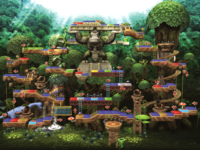
|
| |
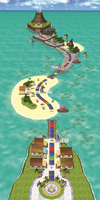
|
| |
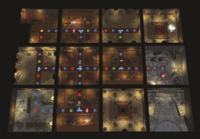
|
| |
| ||
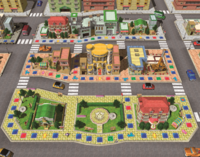
|

|
|
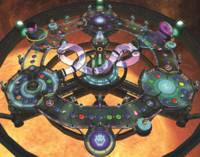
|

|
|
Spaces[edit]
| Image | Space | Description |
|---|---|---|

|
Blue Space | The most common of the spaces, Blue Spaces earn the player three coins when landed on. |

|
Red Space | The opposite of Blue Spaces, taking away three coins when landed on. They are somewhat uncommon but not to the extent of others. One of the bonus stars is from landing on the most Red Spaces. |

|
Green Space | Triggers an event, which varies by board and location and either helps or hinders a player. One of the bonus stars is from landing on the most Green Spaces. |

|
DK Space | Donkey Kong appears and causes something positive to occur, depending on the board. DK Spaces become Bowser Spaces after usage. |

|
Bowser Space | The opposite of a DK Space, where Bowser shows up and causes a negative effect (never a Bowser Minigame, unlike previous installments). There are cases where Bowser may give the player ten coins if they have no coins or Stars. Bowser Spaces appear only in place of DK Spaces, which they revert to after being landed on. |

|
Lucky Space | Lucky Spaces are adorned with sparkling particles and take a player to a lucky area with only Blue Spaces, each containing either a free Star when landed on or an easier method to reach the Star. The only difference is with Bowser's Warped Orbit, which has three Candy Spaces that always give out Bullet Candy or Bowser Candy. |

|
Vs. Space | Exclusive to Star Battle Arena or Duel Battle, Vs. Spaces begin a Duel Minigame between both players, with the winner gaining coins from the loser. |

|
Challenge Space | Another space exclusive to Star Battle Arena or Duel Battle, Challenge Spaces begin a Challenge Minigame. The winner gets to throw a dart at a wheel for 5, 10, or 20 coins, or otherwise nothing. These spaces are the only way to unlock Challenge Minigames. |
Candy[edit]
- Main article: Candy (Mario Party 8)
Candies replace Orbs from the two previous Mario Party titles. They are either bought from a Candy Shop for coins or collected freely from random Candy spaces on the board. Each board provides a different, partial subset of the 14 candy types (in the Candy Shops and on the board itself). Candy may only be used before a player's dice roll, so it cannot be placed on the board. Players can hold a maximum of three Candy items.
Red Candies[edit]
These Candy items alter the Dice Block in some way.
| Image | Space | Description |
|---|---|---|

|
Twice Candy | It adds a second dice block to the roll, very much like the Mushroom Orb from earlier titles. Rolling the same number on both Dice Blocks earns the player 10 coins (30 coins for two "7's"). |

|
Thrice Candy | A variation of Twice Candy, except it involves three Dice Blocks. It is compatible to Super 'Shroom Orbs from the previous installments. Rolling the same number on all three Dice Blocks earns the player 30 coins (or 100 coins for three "7's"). |

|
Slowgo Candy | The dice block roll slows but only allows the player to roll anywhere from one to five. The Slowgo Candy is intended to help the player land on desired spaces. |
Green Candies[edit]
These transform the player very briefly, followed by performing a certain action from the dart wheel.
| Image | Space | Description |
|---|---|---|

|
Springo Candy | Transforms the user into a springy counterpart and allows them to warp to and continue their turn from another player's space chosen by the dart wheel. In a Tag Battle, this only works on opposing players. |

|
Cashzap Candy | The user becomes electrical and zaps an opponent chosen by the wheel to eliminate half their coins. In Team Battle, a random member of the other team is chosen instead. |

|
Vampire Candy | The user becomes a vampire and steals either one, five, or ten coins from whoever the dart wheel chooses, with the coins depositing in their bank afterward. In Star Battle Arena or Duel Battle, the player takes five, ten, or twenty coins instead. |
Yellow Candies[edit]
These transform a player for the duration of their turn, then they return to normal.
| Image | Space | Description |
|---|---|---|

|
Bitsize Candy | The user becomes 8-bit and obtain three coins from hitting a Coin Block each time they move a space. They are obtained only from Candy Areas, not from shops. |

|
Bloway Candy | The user takes the the form of a tornado and warps any opponent they come across back to the start. |

|
Weeglee Candy | The user becomes three tiny clones of themselves and steal any candy of an opponent they pass. They are found only at Candy Areas, not in shops. |

|
Bowlo Candy | The user transforms into a ball version of themselves and steals 10 coins (20 in Duel Battle) from whomever they pass. Shops are passed automatically. |
Blue Candies[edit]
These are like Yellow Candies but are more offense-based.
| Image | Space | Description | Boards |
|---|---|---|---|

|
Thwomp Candy | The user becomes a stone version of themselves, stealing half of the coins from whomever they encounter. The effects also prevent the user from accessing shops. | All |

|
Bullet Candy | The user becomes a Bullet Bill variation of themselves. They can roll three dice blocks and steal up to only one Star from passing others. | Bowser's Warped Orbit |

|
Bowser Candy | The user becomes a Bowser variation of themselves. It is a functional upgrade over the Bullet Candy, as the user rolls two Dice Blocks and can steal up to two Stars. | Bowser's Warped Orbit |

|
Duelo Candy | The user becomes a fiery version of themselves. They roll two Dice Blocks and start dueling whomever they pass. After the duel, the user lands on the same space as the opponent. | All except Koopa's Tycoon Town |
Appearances[edit]
1 - Only obtainable via Chump Charity
Minigames[edit]
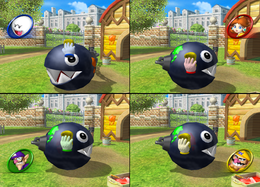
- Main article: List of Mario Party 8 minigames
Mario Party 8 has a total of seventy-three minigames, most of which make use of the Wii Remote and its motion control capabilities, though some also require the controller to be held in a more traditional way. Unlike other Mario Party games, all minigames, rather than a randomized select few, are displayed in a single, large roulette corresponding to what type of minigame they are.
Quotes[edit]
- Main article: List of Mario Party 8 quotes
- "Mario Party 8!" – Mario Party 8 cast
- "Welcome to the Star Carnival!!" – MC Ballyhoo
- "Calling all winners! Calling all losers! We've got a shake up coming!" – Big Top
- "Get ready for a reversal, ya crooks! Let's do the crime warp again! Bwahaha!" – Bowser
Differences from other Mario Party games[edit]
- This is the only installment in the Mario Party series:
- to show all minigames from a selected category on the roulette wheel, instead of only three to six.
- in which the design of the spaces varies from board to board to fit their surrounding aesthetics better.
- to have the minigame win/loss/tie themes on an infinite loop.
- to use different framerates for different parts of the game: menus and most minigames run at the regular 60fps/50fps, while the boards and final results run at 30fps/25fps.
- This is the first Mario Party game that does not have the minigames rules hosted by the host of the board/game, instead put as a separate section in the minigame rules screen. From Mario Party to Mario Party 7, the minigames were all hosted by the hosts of the board and/or the game.
- This is the first Mario Party game that has certain minigames that fit into more than one category.
- This is the first Mario Party game to not count out star and coin totals before the final results announcement.
- In Battle Royale, players retain their player colors based on what player number they were prior to the turn order decision, regardless of turn order number.
- This is one of two Mario Party games where the players' stats while playing in a board are not shown in the four corners of the screen; in this game, it is shown in a column in the top right corner instead. Super Mario Party is the only other Mario Party game that shows the players' stats in a row in the top right corner.
- This is one of two Mario Party games to not feature either Koopa Kid or Bowser Jr., the other being Mario Party-e. However, Koopa Kid's dialogue portrait can still be found in the game files.
Staff[edit]
- Main article: List of Mario Party 8 staff
The game was directed by Shuichiro Nishiya, who previously worked on Mario Party 6 and Mario Party 7 in the same role. Steven Grimm voiced the announcer and Steven Weyte voiced MC Ballyhoo. Satoru Iwata and Hidetoshi Endo, president of Hudson Soft at the time, are credited as executive producers.
Reception[edit]
As with most Mario Party games, reviews of Mario Party 8 were mixed. Common criticisms for Mario Party 8 included the lack of Wi-Fi, limited graphics, and absence of widescreen for the main game. Matt Casamassina of IGN referred to the single-player mode as "torture" and commented on the visuals as "graphics don't even impress as a GCN title".
Andy Myers of Nintendo Power gave the game a 7.5/10.[4] He praises the inclusion of motion controls and how the minigames which use it each has a different approach. However, he states that the visual presentation is the weakest aspect of the game. He explains that the front-end interface is confusing, the lack of a true widescreen mode is disappointing, and the graphics leave much to be desired even though they have been slightly improved from Mario Party 7. Despite these criticisms, he thinks the game takes its place alongside other party games like Wii Sports and WarioWare: Smooth Moves.
| Reviews | |||
|---|---|---|---|
| Release | Reviewer, Publication | Score | Comment |
| Wii | Ryan Davis, GameStop | 6.5/10 | Mario Party had been the only persistent minigame franchise for years, and Hudson got a little too comfortable because of it. The fact that there are more interesting minigame collections out there now, like Rayman Raving Rabbids, puts that laziness in stark relief and makes it more difficult to tolerate. If you've got the patience to dig past the skill-free board game portions of Mario Party 8, there are some genuinely inventive minigames to be played. The point, though, is that you shouldn't have to dig at all. |
| Wii | Gerald Villoria, Gamespy | 3/5 | While unimpressive from a technical standpoint, and uninspired from a mini-games standpoint, the core Mario Party formula remains intact. As with any multiplayer oriented game, having a good time is always possible as long as you surround yourself with good friends. So yes, this eighth installment of the series may be worth your while if you like throwing Wii parties and have exhausted all of the Wii's better such games already. Otherwise, you're not missing much. |
| Wii | Mathew Kumar, Eurogamer | 4/10 | Mario Party 8 is a "would have, should have, could have" kind of game. With such an depressingly long list of wasted possibilities, and so many other mini-game collections available for Nintendo Wii (The excellent Rayman Raving Rabbids, for one) It would be wrong of me to say you should pick this up. Fun could be had here, but even with the most forgiving group of friends, it's going to be short-lived. |
| Aggregators | |||
| Compiler | Platform / Score | ||
| Metacritic | 62 | ||
| GameRankings | 62.98% | ||
Sales[edit]
After its North American release on May 29, 2007, the game sold 314,000 units in the United States in three days, making it the best-selling home console game in the country that month.[5] In Japan, Mario Party 8 has sold 1,239,716 copies as of the end of Q2 2008, according to Famitsu.[6] Mario Party 8 has sold 8.85 million copies worldwide, making it the 12th best-selling game on the Wii and the third best-selling game in the Mario Party series (behind Mario Party DS and Super Mario Party).[7]
Controversy[edit]
The launch of Mario Party 8 in the United Kingdom had several difficulties. Originally scheduled for release on June 22, 2007, Nintendo announced on June 19, 2007 that the UK version of the game had been delayed to July 13 of that year due to a production issue.[8]
Furthermore, upon the release on July 13, 2007, the game was immediately recalled. Nintendo gave a reason for the withdrawal in a press release:[9]
"[Mario Party 8] was launched in the UK today. Unfortunately we have discovered that a small number of games contain the wrong version of the disk due to an assembly error. We have therefore decided to recall all copies of the game from UK retailers so that this mistake can be corrected. We will re-launch Mario Party 8 in the UK as soon as possible and will announce a new launch date shortly. We very much regret any inconvenience caused."
The European/British retailer GAME confirmed[9] that the game was withdrawn from shelves because some copies included an offensive line as part of a magic spell used by Magikoopa in the board Shy Guy's Perplex Express:
"Magikoopa magic! Turn the train spastic! Make this ticket tragic!"
Because "spastic" has a highly negative connotation in the United Kingdom, the game was declared banned and immediately recalled. Mario Party 8 was eventually re-released on August 3, 2007, with the offensive statement altered; European copies use the word "erratic" instead and American copies use a completely different statement: "Let me use my magic to make this all a little more interesting!"
Although it is unknown if Mario Party 8 is the direct catalyst, several first-party Nintendo games released after it have had at least a few English localization differences between the American and British releases instead of using the American English text for all regions. A similar offense in Super Paper Mario with the word "shag" was preemptively altered for the European release.
Pre-release and unused content[edit]
- Main article: List of Mario Party 8 pre-release and unused content
Three minigames go unused in the game's files. They do not have an English name nor a gameplay demonstration on the explanation screen. One of them is titled "Hammer de Pokari", a 4-Player minigame. It takes place on a sandcastle which does not appear elsewhere in the game. The objective is to swing a hammer at opponents by swinging the Wii Remote sideways. A coin counter is present, but it is not affected by the characters' actions. The minigame ends when one player is hit five times. The player who hit the most wins.
Regional differences[edit]
- The American and European versions use different fonts for text; the font used for the main text in the European version is the same as the font used from Mario Party 4 to Mario Party 7.
- In the English version, when starting a minigame, the announcer shouts "Go!" with the word "START" appearing onscreen. Additionally, when tying a minigame, "Tie" appears on the screen with the announcer calling that. In the Japanese version, "Start!" is shouted instead at the start of a minigame, and when a minigame is tied, "DRAW" appears onscreen with the announcer calling that.
- In the European version of the game, when one player wins a minigame, the text "Win" appears instead of "Wins".
- In the European version of the game, there is no "×" displayed before the star and coin count in the player panels, even when a player has fewer than 10 stars or 100 coins.
- In the PAL version, many of the targets in Test for the Best are more lenient than in the NTSC version.
Gallery[edit]
- For this subject's image gallery, see Gallery:Mario Party 8.
Media[edit]
- For a complete list of media for this subject, see List of Mario Party 8 media. For this subject's sound test, see Mario Party 8 sound test.
| File info 0:27 |
| File info 0:30 |
| File info 0:30 |
| File info 0:30 |
| File info 0:30 |
| File info 0:30 |
| File info 0:05 |
References to other games[edit]
- Super Mario Bros.: Sprites of Mario and Bowser appear in Bowser's Warped Orbit and sprites of Mario appear at the Star Battle Arena, printed on the toybox of Mosh-Pit Playroom and on the wrapper of Bitsize Candy.
- Super Mario Sunshine: Piantas appear in Goomba's Booty Boardwalk.
- Mario Kart: Double Dash!!: The dinosaur Nossie from Dino Dino Jungle appears in DK's Treetop Temple. When a player lands on a Bowser Space in Shy Guy's Perplex Express, the Bowser face on the front of the train resembles the face on the front of the Koopa King, Bowser's signature kart.
- Mario Party 4 to Mario Party 7: Many animations from these games are reused.
References in later games[edit]
- Mario Party DS: The playable characters' profile models are reused in this game.
- Super Smash Bros. Brawl: MC Ballyhoo & Big Top appear as a trophy and sticker. Artwork of a Chain Chomp and Dice Block from Mario Party 8 appear in this game as stickers.
- Mario Kart Wii: Daisy's artwork for Mario Party 8 is reused, but with her kart added to it.
- Super Mario Run: Princess Peach and Bowser's artwork are reused.
- Mario Party: The Top 100: Three minigames return in this game. A cover version of the minigame completion theme plays when completing any of the three Mario Party 8 minigames. MC Ballyhoo and Big Top make a cameo in the Characters section of the Series Guide.
- Super Smash Bros. Ultimate: MC Ballyhoo and Big Top appear as a spirit. Luigi and Daisy's fighter spirits use their Mario Party 8 artwork.
- Mario Kart Tour: Dry Bones and Hammer Bro's artwork are reused in this game.
- Mario Party Superstars: Two minigames and rearrangements of their respective music return.
- Super Mario Party Jamboree: Night Lights and Chomp Wash are heavily based on Crank to Rank and At the Chomp Wash, respectively.
Names in other languages[edit]
| Language | Name | Meaning | Notes |
|---|---|---|---|
| Japanese | マリオパーティ8[?] Mario Pāti 8 |
Mario Party 8 | |
| Chinese (traditional) | 瑪利歐派對8[10] Mǎlìōu Pàiduì Bā |
Mario Party 8 | |
| French | Mario Party 8[?] | - | |
| German | Mario Party 8[?] | - | |
| Italian | Mario Party 8[?] | - | |
| Korean | 마리오 파티 8[?] Mario Pati 8 |
Mario Party 8 | |
| Spanish | Mario Party 8[?] | - |
References[edit]
- ^ Nintendo :: Games :: Mario Party 8. Nintendo of America (American English). Archived December 13, 2007, 03:19:15 UTC from the original via Wayback Machine. Retrieved May 23, 2018.
- ^ Mario Party 8 | Wii | Games | Nintendo UK. Nintendo UK (British English). Retrieved May 23, 2018.
- ^ マリオパーティ8. Nintendo Co., Ltd. (Japanese). Retrieved November 4, 2009.
- ^ July 2007. Nintendo Power Volume 217. Nintendo of America (American English). Page 92.
- ^ Berardini, César A. (June 15, 2007). May Video-Game-Sales – Nintendo PWNS Everyone Again. Team Xbox (English). Archived March 4, 2012, 15:43:38 UTC from the original via Wayback Machine. Retrieved June 25, 2024.
- ^ Gantayat, Anoop (June 16, 2012). Five Million Wiis in Japan. IGN (English). Retrieved June 25, 2024. (Archived February 19, 2023, 15:32:27 UTC via Wayback Machine.)
- ^ Celine (October 23, 2021). Nintendo software and hardware sales data from 1983 to present. Install Base (English). Retrieved May 9, 2022.
- ^ Fletcher, Jc (June 20, 2007). Mario late to his own party in UK. Engadget (English). Retrieved June 25, 2024.
- ^ a b Frazer, James (July 13, 2007). Mario Party 8 – banned!. Thunderbolt (English). Archived June 10, 2016, 09:40:10 UTC from the original via Wayback Machine. Retrieved June 25, 2024.
- ^ Wii遊戲軟體. Nintendo HK (Traditional Chinese). Retrieved June 25, 2024.
